ChatGPT is a revolutionary technology that will significantly change how we work.
As a programmer, I initially didn’t believe it could solve advanced tasks, but I was surprised to see how helpful it can be in my daily life.
So, I started playing around with ChatGPT and discovered several ways it could help me – and I think SEO pros and marketers should master it and make it part of their daily working routing as an assistant tool.
Let’s break down examples by niches you can use, such as:
- Analytics and Data.
- Digital Marketing.
- Productivity.
- Technical SEO.
- Keyword Research.
- On-Page SEO.
But before we start, I would like to point out one caveat you have to remember: The data that ChatGPT was trained on is from the third quarter of 2021 and based on what is available on the internet, which may contain misinformation and outdated.
That means fact-checking and revising ChatGPT’s answers are mandatory, so you don’t fall into trap of errors made by the machine.
Examples Of ChatGPT For Analytics And Data
1. Compose Regular Expressions In Analytics Reporting
Regular expressions can be used in composing analytic reports such as Google Search Console (GSC) or Google Analytics (GA).
Regular expressions are one of the most boring tasks I know, and it may really slow down work. For marketers, it is even tougher, as they typically don’t have a technical background.
Let’s look at an example of GSC’s reporting, which supports filtering by regexp (regular expression).
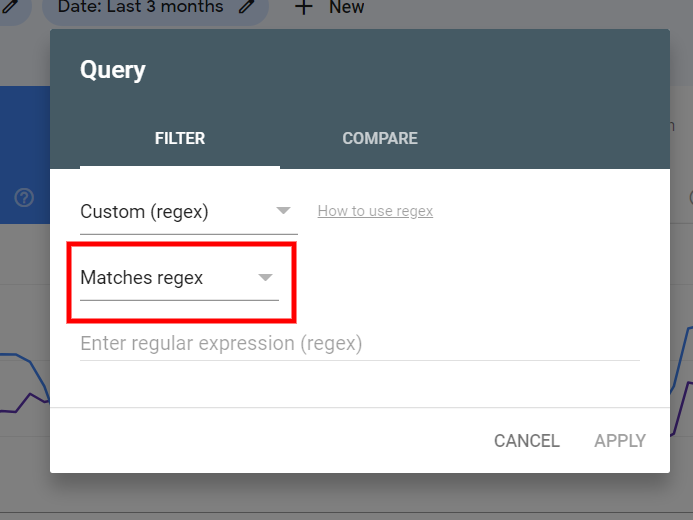 Screenshot of GSC Query Filter by Regexp, January 2023
Screenshot of GSC Query Filter by Regexp, January 2023If you are a marketer with no technical background, you may find it hard to use this feature and limit yourself to the few basic regexps, which you can find by searching dev-related forums.
Now, you have ChatGPT at your disposal.
Just go to ChatGPT and ask: Compose regular expression which starts with “How To” or “What is” case insensitive using RE2 syntax.
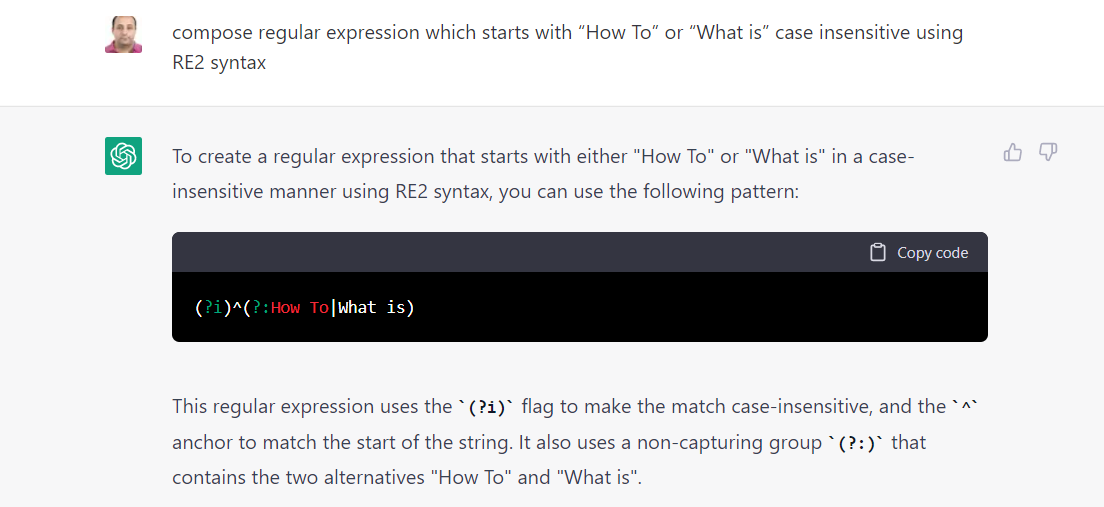 Screenshot of ChatGPT response, January 2023
Screenshot of ChatGPT response, January 2023Yup!
(?i)^(?:How To|What is)It got the job done instantly.
Copy and paste the pattern in GSC’s filter field, and you will have all the queries that are candidates to optimize for FAQ or HowTo schema.
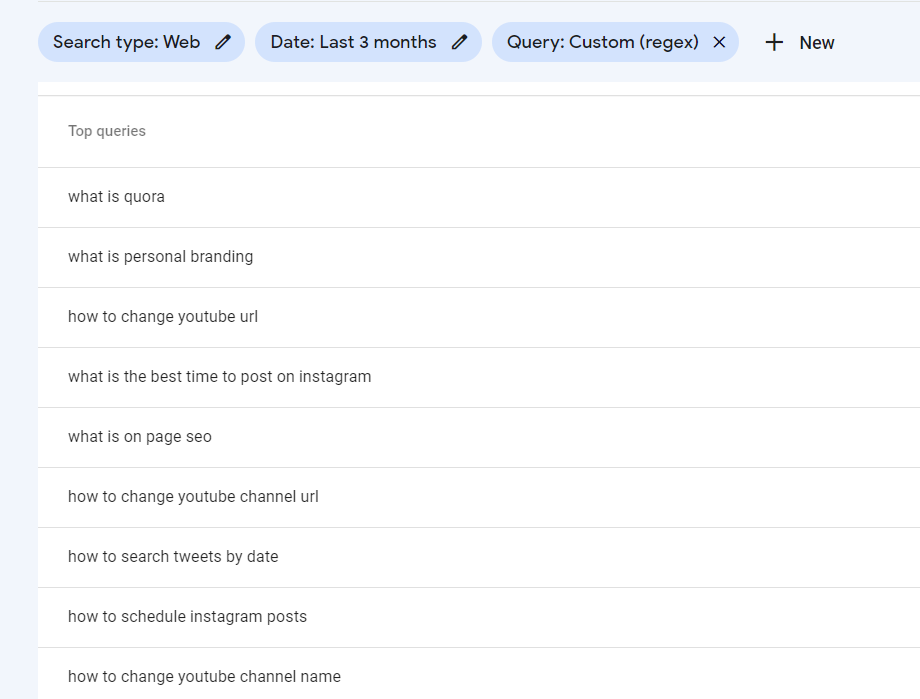 Screenshot of GSC report, January 2023
Screenshot of GSC report, January 2023Pretty easy, isn’t it?
You can use it to compose regexp for GA reports as well.
For example, let’s say you want to filter a report which has in the URL the words “Samsung” and “phone.”
Just ask ChatGPT: Compose regular expression which contains words “Samsung” and “phone” case insensitive using RE2 syntax.
Just to note, it is important to mention “RE2 syntax” in the command, as Google’s reporting dashboards support that syntax.
2. Compose Complex Spreadsheet Formulas
Everyone works with Excel or Google Sheets at some time.
Spreadsheets are a part of daily work life for many of us. But composing spreadsheet formulas can be arduous, as you must research to find the function name you need and then spend 10 to 15 minutes figuring out how to make it work.
Now, it just takes you a minute to ask ChatGPT with a command like: Google Sheet formula which copies all rows from sheet1 where column "A" contains word "iphone".
And it didn’t take long to get the solution.
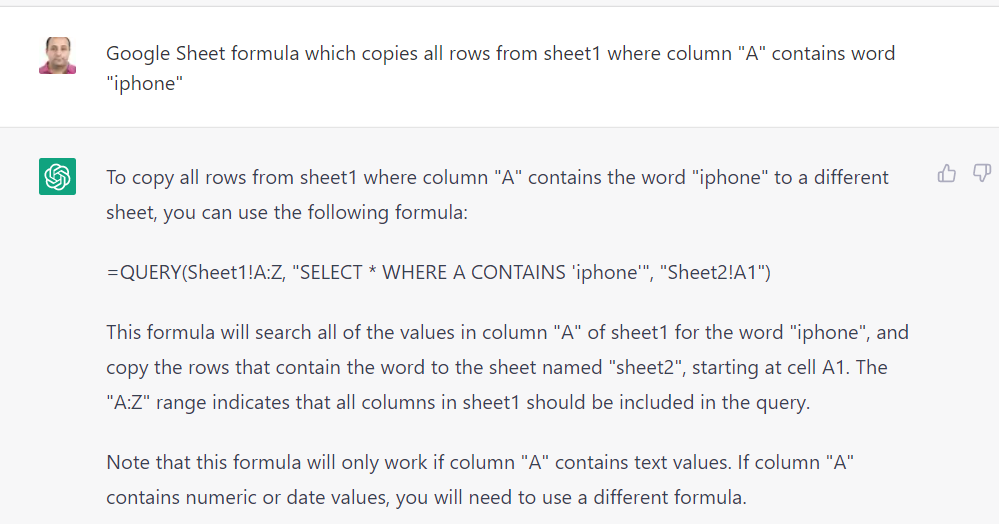 Screenshot of Google Sheet Formula created by ChatGPT, January 2023
Screenshot of Google Sheet Formula created by ChatGPT, January 2023But, the formula it gave =QUERY(Sheet1!A:Z, "SELECT * WHERE A CONTAINS 'iphone'", "Sheet2!A1") has a small error.
Of course, ChatGPT doesn’t always provide 100% correct answers. You should always check its answers, as you may need to fix them manually.
The formula I got is 99% correct, except that the third parameter shouldn’t be there.
So, I removed it manually and now have =QUERY(Sheet1!A:Z, "SELECT * WHERE A CONTAINS 'iphone'") which works perfectly!
I always recommend using punctuation in ChatGPT to help it better understand the prompt.
For example, use a colon to end the prompt or quotes around any text that isn’t part of the prompt.
3. Composing SQL queries
With the introduction of GA4, marketers may often need to fetch data from BigQuery, as Google now offers a free connection of GA4 to BigQuery.
To query the dataset, you would need to learn SQL – or just ask ChatGPT to build a specific query for you to extract valuable data without sampling from the dataset.
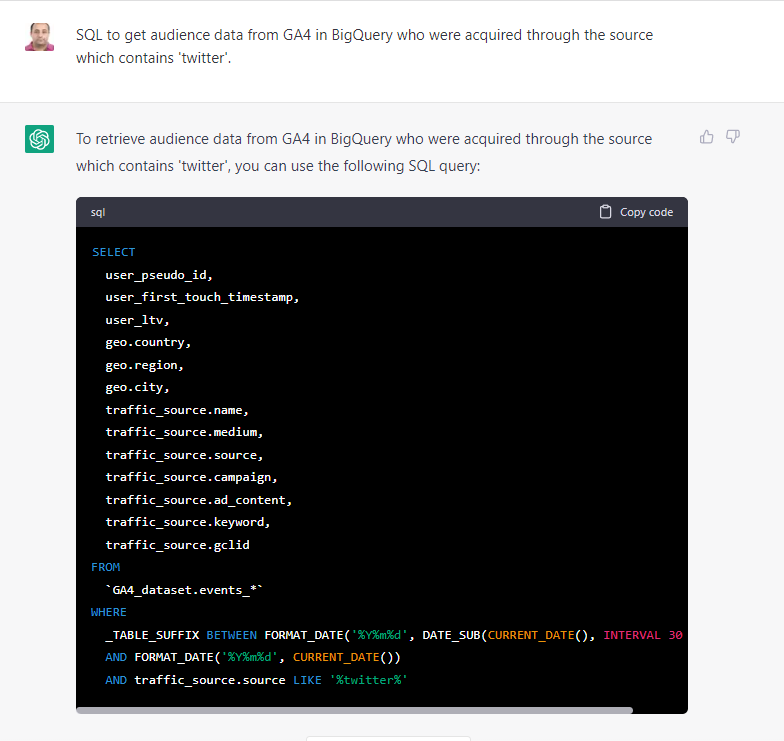 Screenshot of an SQL sample using ChatGPT, January 2023
Screenshot of an SQL sample using ChatGPT, January 2023Examples Of ChatGPT For Digital Marketing
When using ChatGPT for market research and your brand marketing, always remember that it was trained on data up to the third quarter of 2021 and thus may not be the best tool for dealing with current trends.
But it is a handy tool for many other tasks you may have. Let’s take a look at some of them.
4. Generate Audience Personas
Let’s say you’ve launched a new SaaS company and want to know who your audience is so that you can build your marketing efforts around them.
You can ask ChatGPT to create audience personas.
The prompt I would use is Create audience personas for the "physical threat detection software."
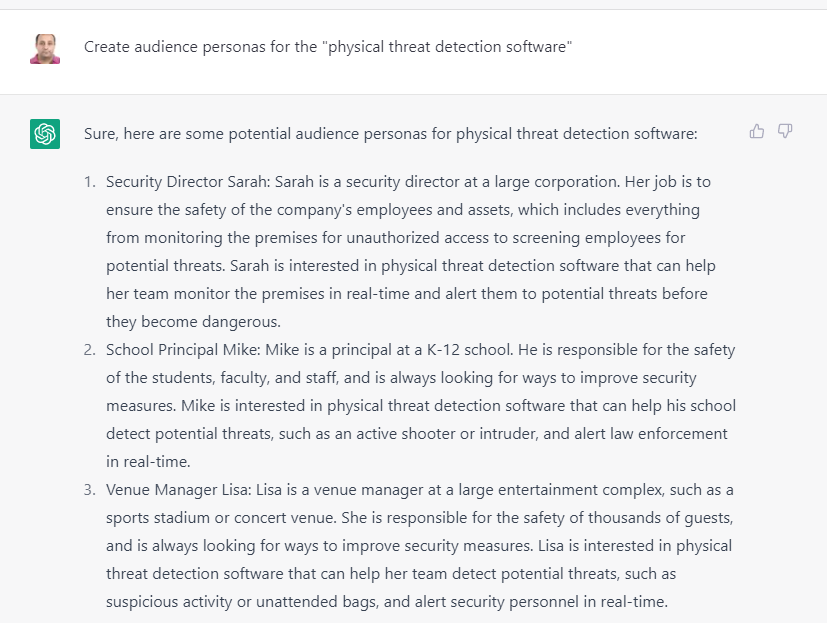 Screenshot of an audience persona created by ChatGPT, January 2023
Screenshot of an audience persona created by ChatGPT, January 2023And the results are just a great place to start.
This doesn’t mean you should fire your marketing leader, but now, they have a tool that can 10x boost their performance and deliver faster results.
5. SWOT Analysis
This is a really cool prompt you can use for your brand or competitive analysis.
You can ask to do a SWOT analysis of any company.
For example, I used the prompt SWOT analysis of "Washington Post" , and the results were a very interesting starting point.
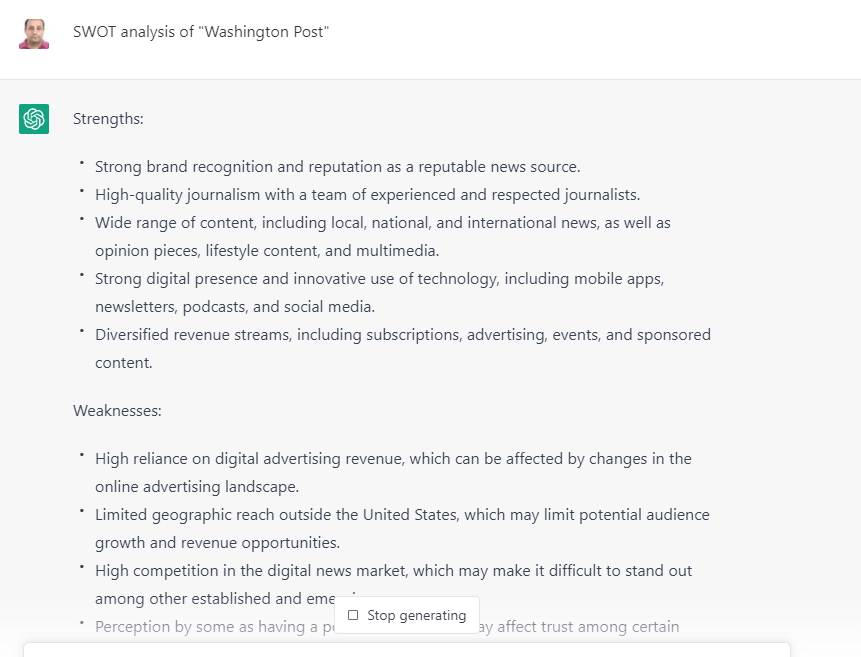 Screenshot of SWOT analysis by ChatGPT, January 2023
Screenshot of SWOT analysis by ChatGPT, January 20236. S.M.A.R.T. Goals
SMART goals are important because they provide a clear framework for setting and achieving objectives.
With ChatGPT, you can get ideas for your company using the prompt S.M.A.R.T. goals for SaaS "<company name>."
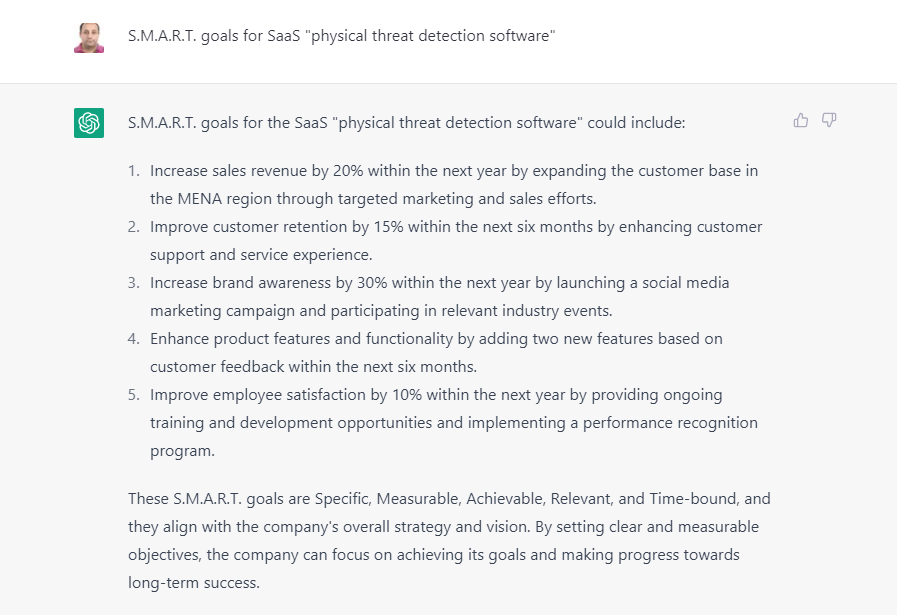 Screenshot of SMART Goals by ChatGPT, January 2023
Screenshot of SMART Goals by ChatGPT, January 20237. Craft A Newsletter
You can use ChatGPT to craft an outline for the newsletter campaign you want to run.
Let’s say you have a sale on Black Friday and want to send a newsletter to promote your offer.
Just ask, Craft an email campaign newsletter on Black Friday for SaaS "<company name>" which offers 20% discount. Include a catchy call to action button at the end of the email.
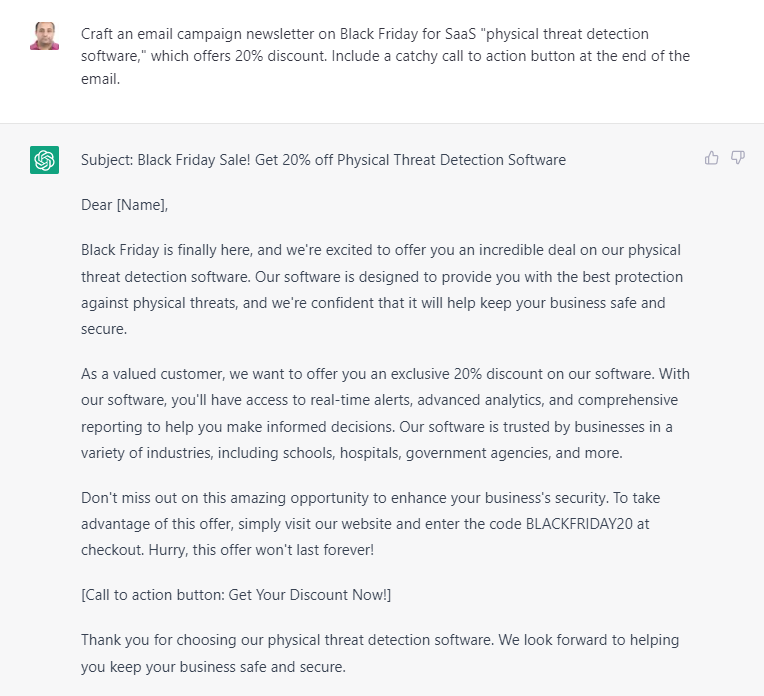 Screenshot of an email newsletter generated by ChatGPT, January 2023
Screenshot of an email newsletter generated by ChatGPT, January 2023Examples Of ChatGPT For Productivity
8. Craft Pitch Emails
Again, if you are a SaaS startup, you definitely need to sell your software.
Your sales team needs to pitch prospective customers and respond to hundreds of emails, which is exhausting and can be a slow process.
Increasing the productivity of your sales team can help you sell more and increase your revenue.
The example prompt you can use here is Craft a pitch email for selling "physical threat detection software."
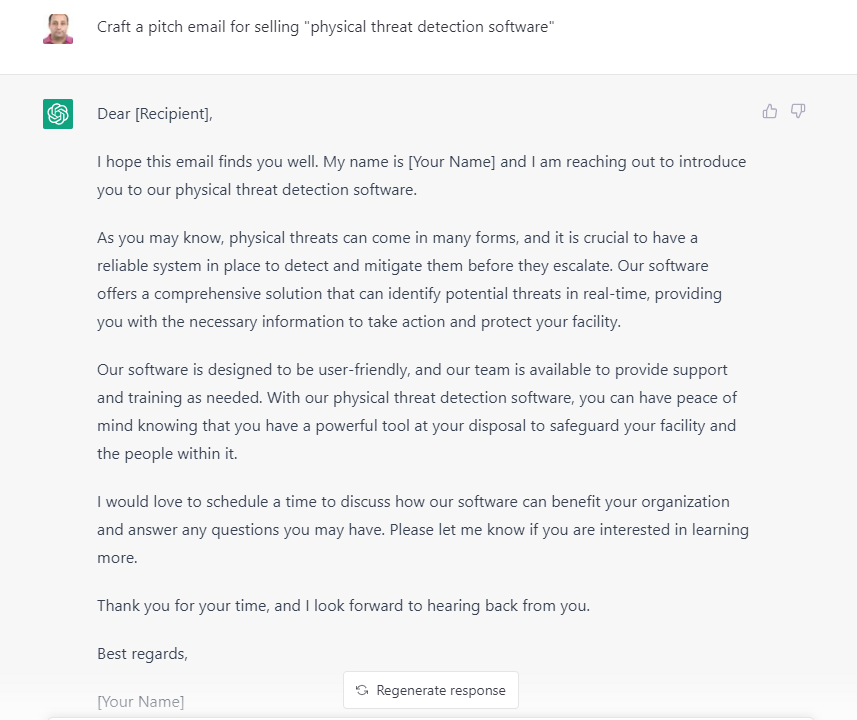 Screenshot of a pitch email example generated by ChatGPT, January 2023
Screenshot of a pitch email example generated by ChatGPT, January 2023Alternatively, there is a Chrome add-on that you may use.
9. Craft A Social Media Post
Let’s say you’ve published articles and want to push them to social media.
You would need a well-crafted and compelling text to post on social media so that users will click on your post.
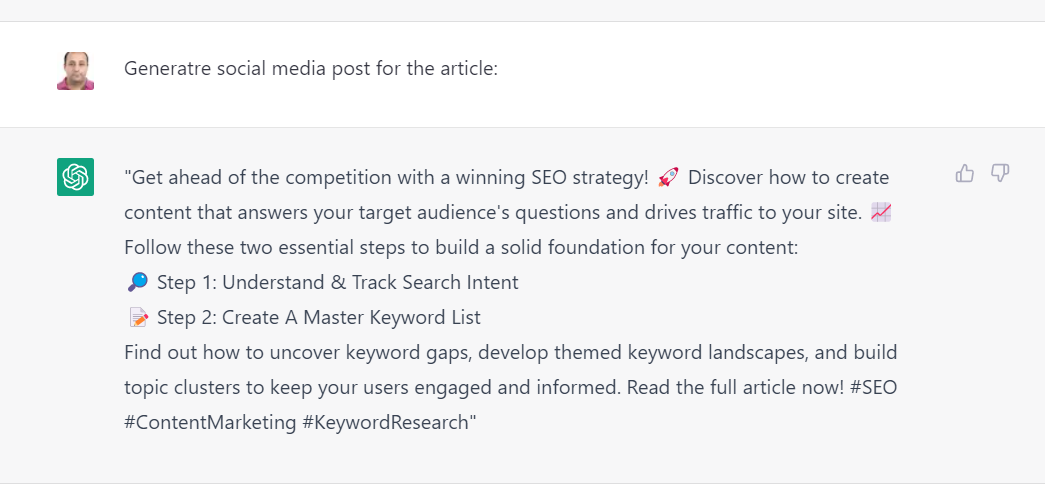 Screenshot of social media posts crafted by ChatGPT, January 2023
Screenshot of social media posts crafted by ChatGPT, January 2023I bet you would spend at least 15 minutes composing such a compelling social media post. But now, you can do it in one minute.
10. Write Ad Copy
If you are a PPC marketer, you deal a lot with creating ad copy – and having an extra resource to provide you with thought starters could save hundreds of hours a month for you.
The sample prompt I used is Write a Google ad text with a title of up to 30 characters and a description of up to 90 characters for SaaS "physical threat detection software."
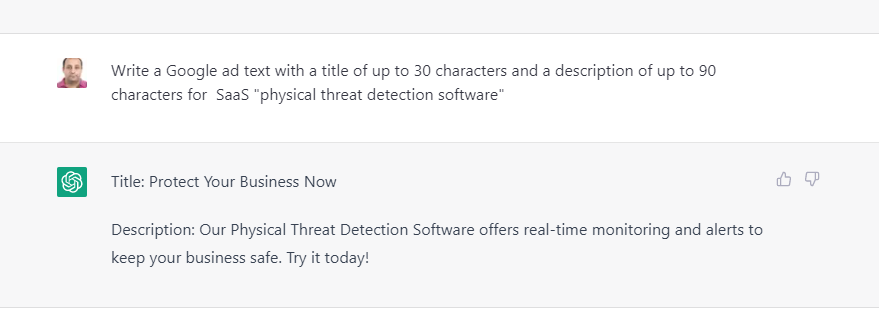 Screenshot of an ad copy by ChatGPT, January 2023
Screenshot of an ad copy by ChatGPT, January 2023You may also include blog post article text from which to generate the ad copy, which will be more specific to you.
The sample prompt would be: Write a Google ad text with a title of up to 30 characters and a description of up to 90 characters for SaaS "<company type>" from the text below.
Just replace the prompt with the company type with your version.
11. Craft A Job Description
All companies need to hire, meaning they must write job descriptions.
Now, ChatGPT can help with that, too.
For example, Job description of Social Media Manager for real estate company.
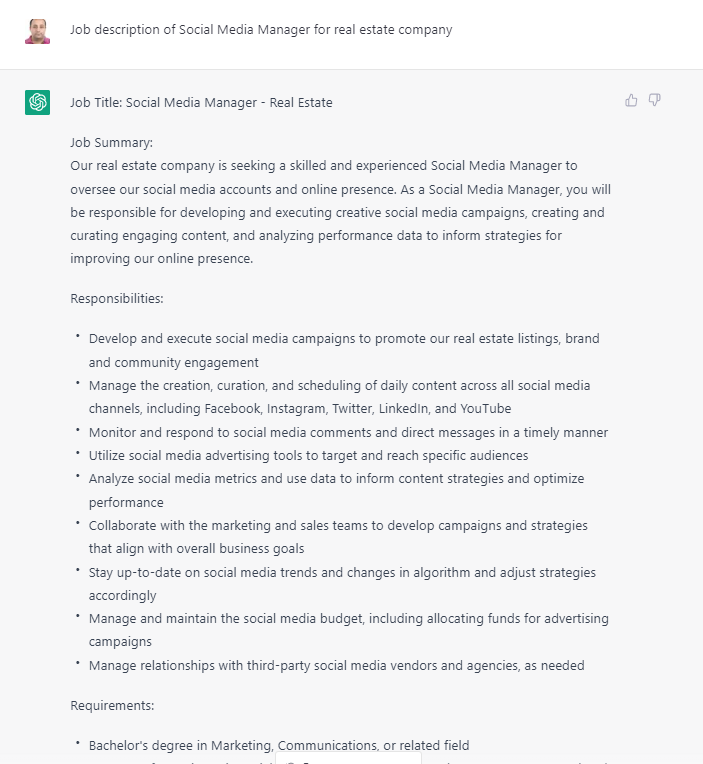 Screenshot of a job description generated by ChatGPT, January 2023
Screenshot of a job description generated by ChatGPT, January 2023Always remember you can finetune the prompt by adding more details to it, which will make the answer even better.
Examples Of ChatGPT For Technical SEO
12. Generate FAQ Schema
You can have ChatGPT generate FAQ schema code from a text you provide.
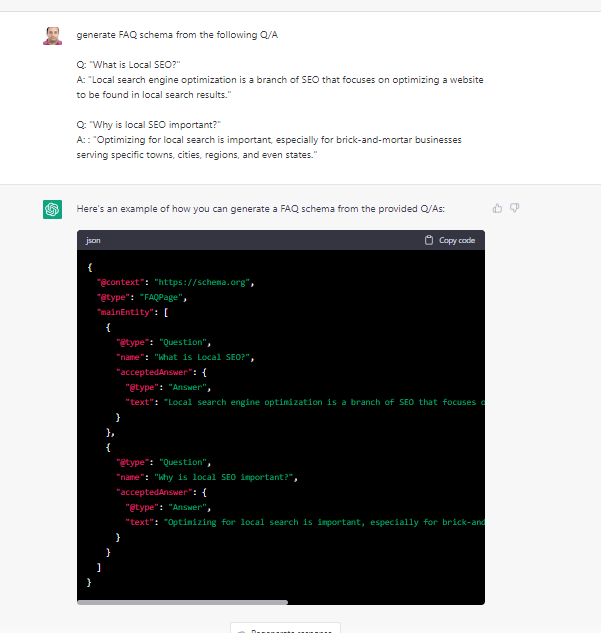 Screenshot of an FAQ schema generated by ChatGPT, January 2023
Screenshot of an FAQ schema generated by ChatGPT, January 2023Of course, you may use a CMS plugin for that, too.
But what if you use Wix, for example, which doesn’t have a plugin? Should you copy and paste schema code into the editor? In this case, ChatGPT is a handy tool and assistant at your disposal.
You can generate any kind of schema by using a similar example.
13. Generate HowTo Schema
In the case of the HowTo schema, you can enter a similar prompt as we did for FAQ, and ChatGPT will do 99% of the job.
The prompt would be,Generate HowTo schema on how to bake a cake from the steps below and suggest images with each step.
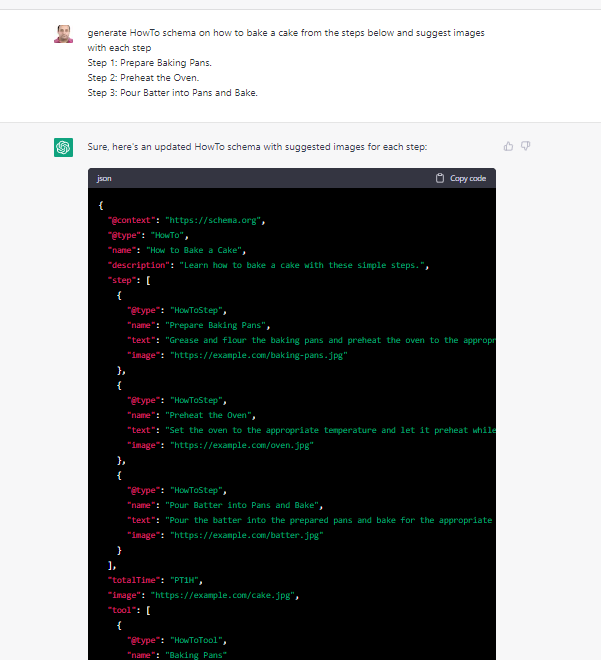 Screenshot of a HowTo schema generated by ChatGPT, January 2023
Screenshot of a HowTo schema generated by ChatGPT, January 2023Why 99% and not 100%? Simply because you need to replace sample image URLs.
It did, however, add HowTo schema steps with real images.
Just upload images in your CMS and replace the sample image path in the suggested schema.
14. Create Robots.txt Rules
SEO pros deal with robots.txt a lot.
Now you have a tool that can help you create any robots.txt rules with ease.
Below is an example of how to prevent Google from crawling your PPC campaign landing pages, which are located in directory /landing/but let Google ads bot in.
The prompt you can use is Robots.txt rule which blocks Google's access to directory /landing/ but allows Google ads bot.
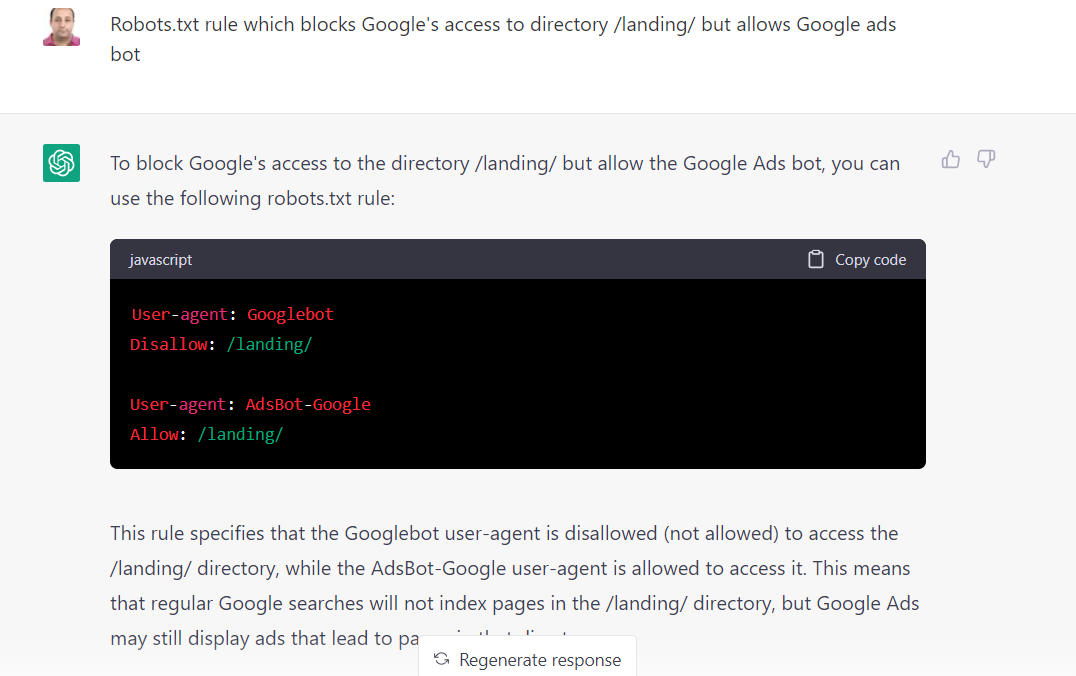 Screenshot of a robots.txt rule created by ChatGPT, January 2023
Screenshot of a robots.txt rule created by ChatGPT, January 2023After you’ve done edits, always test your robots.txt.
15. Generate htaccess Redirect Rules
SEO pros often deal with migrations and may need to redirect a lot of stuff, depending on what type of server one has.
You can now generate htaccess or Nginx redirect rules using ChatGPT.
The prompt I used is For redirecting folder1 to folder2 generate nxig and htaccess redirect rules,
The results are just neat.
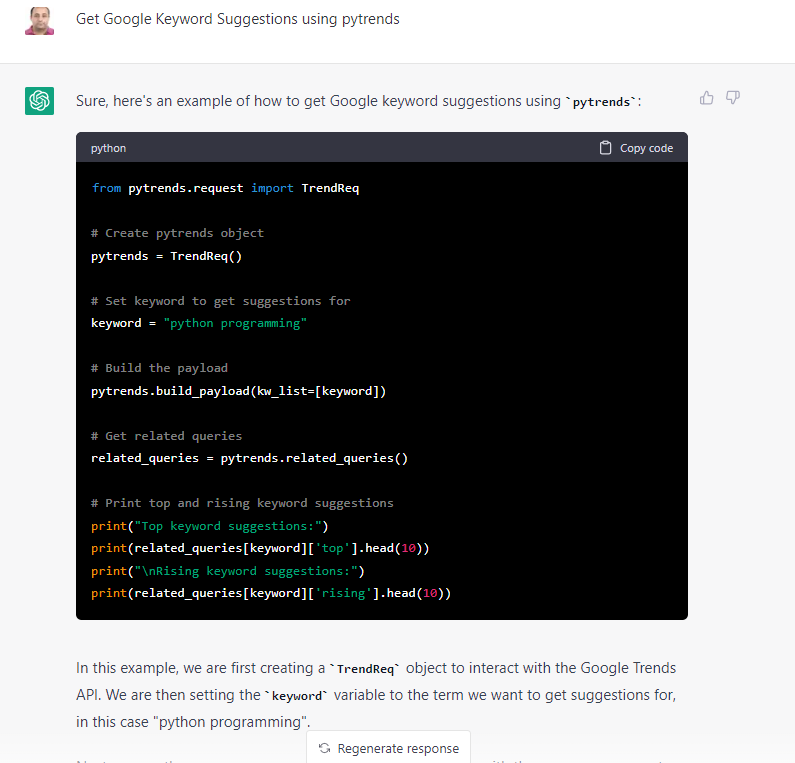 Screenshot of a Python script generated by ChatGPT, January 2023
Screenshot of a Python script generated by ChatGPT, January 202316. Connect To APIs And Coding
SEO pros often need to connect to various APIs and fetch data, but may lack programming skills.
Now you have ChatGPT at your disposal for basic tasks which require programming.
In the example below, I asked ChatGPT to get Google autosuggestion using the known “pytrends” library.
 Screenshot of a Python script generated by ChatGPT, January 2023
Screenshot of a Python script generated by ChatGPT, January 2023You can basically use ChatGPT for coding in all programming languages.
The same prompt may be composed to ask the same, but in PHP: Get Google Keyword Suggestions using PHP.
For running PHP on your local machine, you may use the free environment XAMPP; for running Python, you may use Jupiter.
If you are a PPC marketer who wants to set up custom conversions when users perform certain actions on the website but don’t have a web developer’s help, it could be quite challenging in some situations.
Yes, you can use Google Tag Manager in many cases when users click on the link, but you could need something different, which is not a built-in feature of GTM.
For example, you need to send a conversion event when one lands on your landing page and scrolls through 35% of the page.
Now, you don’t need to hire a developer to get the job done.
Just go to ChatGPT and ask: Send Facebook pixel custom conversion event once as users scroll through 35% of the page using JavaScript, and it will do the magic!
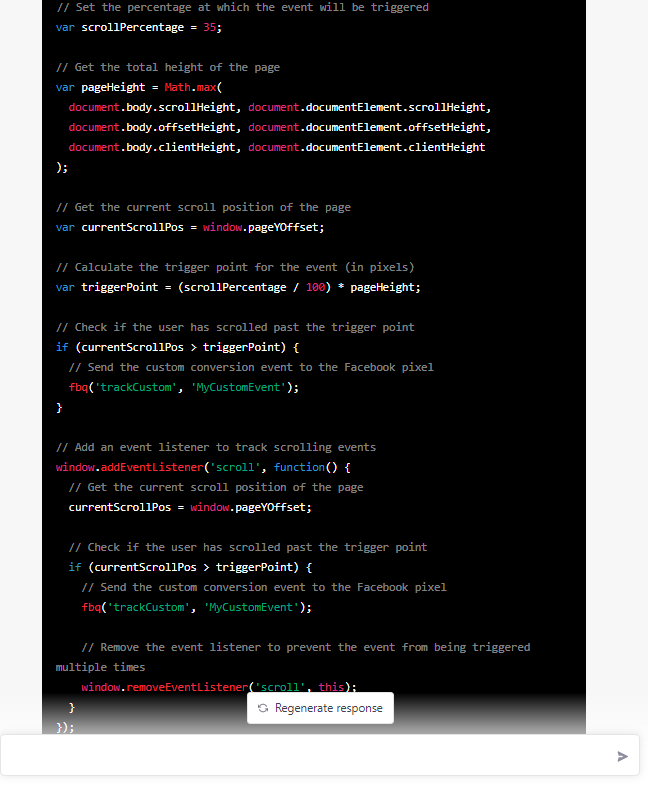 Screenshot of JavaScript code firing custom Facebook pixel event, January 2023
Screenshot of JavaScript code firing custom Facebook pixel event, January 2023You can copy and paste this code in your <head> tag of HTML, and you are done.
If you have a WordPress site, you can use plugins such WPCode to make the job easier.
Alternatively, you can use Google Tag Manager custom HTML tag to add your JavaScript code there.
It saves you the time of having to find a developer for small daily tasks. And even if you do have a dev team, you can significantly reduce their workload by doing it yourself.
Examples Of ChatGPT For Keyword Research
17. Get Keyword Ideas
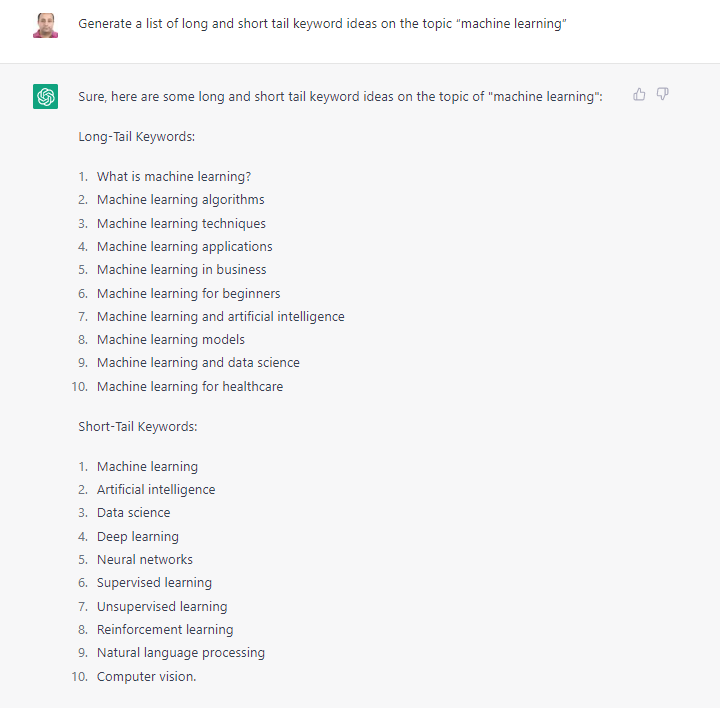 Screenshot of long-tail keywords generated by ChatGPT, January 2023
Screenshot of long-tail keywords generated by ChatGPT, January 2023An example prompt you can use is Generate a list of long and short tail keyword ideas on the topic “machine learning.”
Now SEO tools have a serious competitor that’s free to use.
The only caveat is that, as I’ve mentioned already, ChatGPT is trained on data up to the third quarter of 2021 and isn’t connected to the internet. Thus, it may fail to work in cases when you need more recent data.
For example, I asked who won Fifa 2022 World Cup, and it failed to answer.
 Screenshot from ChatGPT, January 2023
Screenshot from ChatGPT, January 202318. Get The Search Intent Of The Search Query
You have a lot of data in your GSC, which now you can copy and paste into ChatGPT to get more insights.
For example, you can copy-paste a list of search queries and ask for the intent of the query using the prompt What is the user intent behind these queries?.
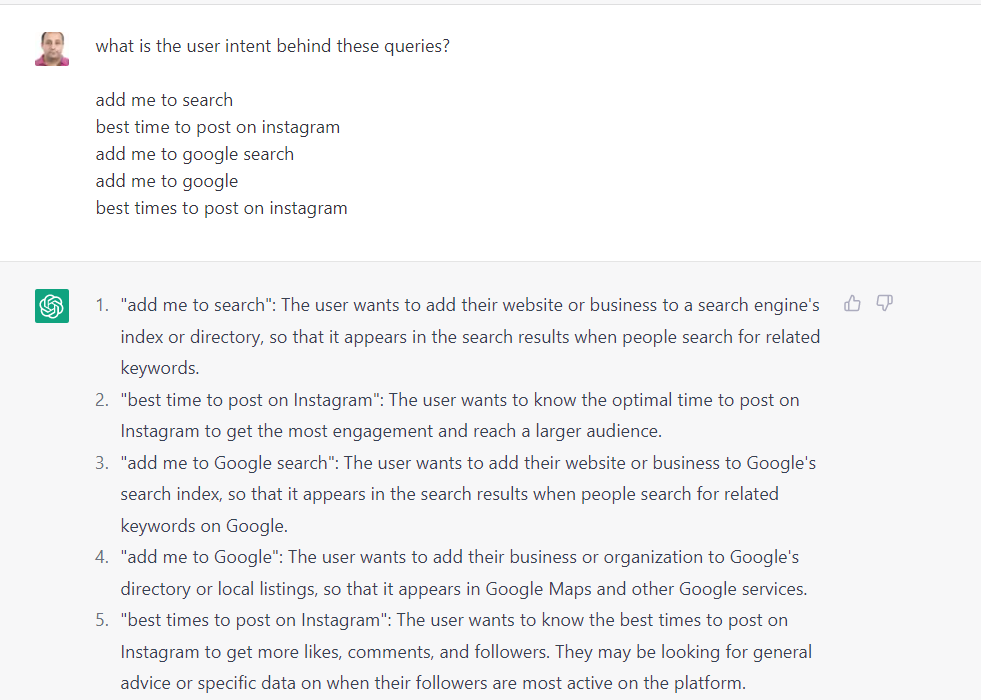 Screenshot of a search intent generated by ChatGPT, January 2023
Screenshot of a search intent generated by ChatGPT, January 202319. Cluster Semantically Relevant Keywords
Again, you can use ChatGPT to organize the keywords you rank for – and not only those – into clusters: Cluster list of keywords based on their semantic relevance.
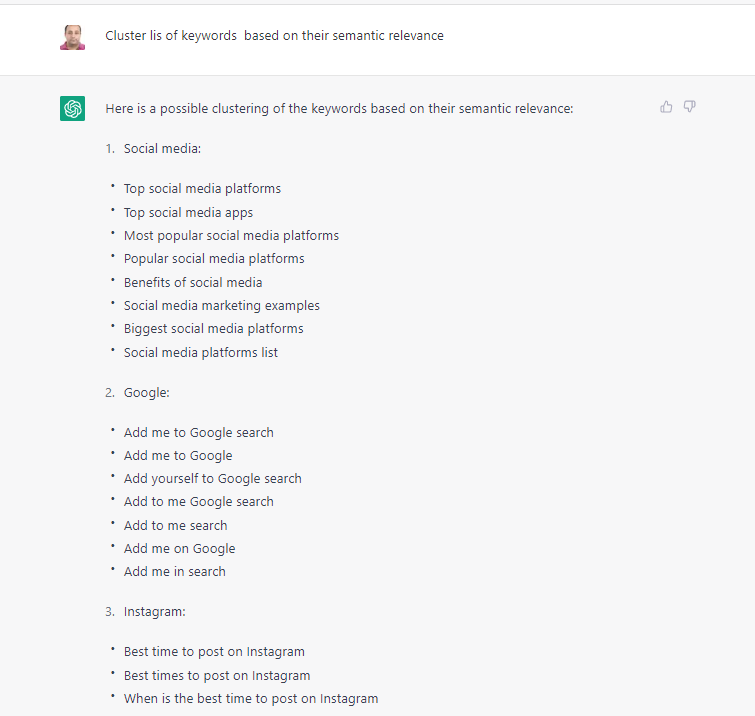 Screenshot of ChatGPT, January 2023
Screenshot of ChatGPT, January 2023Another case is to identify pages that rank for semantically relevant queries and restructure your URLs under silos.
For example, bring all pages that are about social media or under /social-media/ silo, which can help you boost ranking and help Google better understand your website structure.
20. Generate Related Keywords And Synonyms
It is always good to mention your content-related keywords and synonyms.
You can do it at scale by using ChatGPT.
Just ask:Generate related keywords or the list of keywords below.
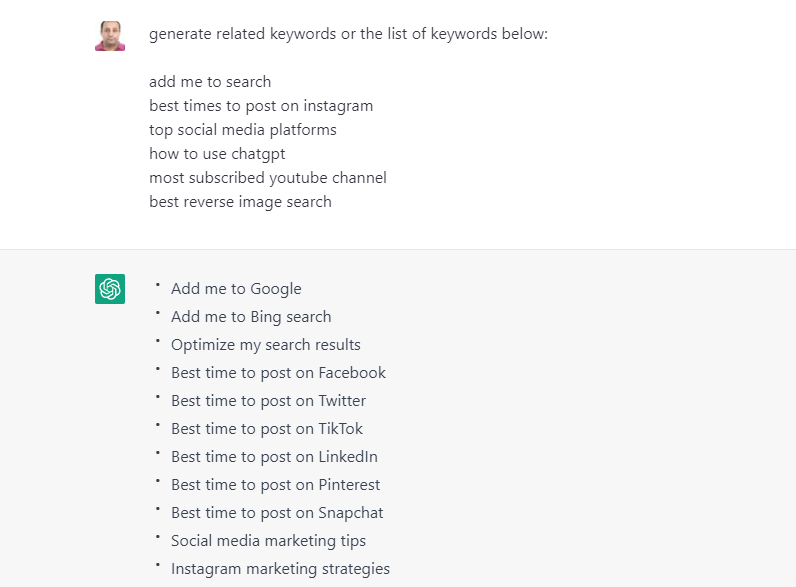 Screenshot from ChatGPT, January 2023
Screenshot from ChatGPT, January 202321. Generate Article Titles Based On Keywords
As you have keywords you want to write articles about, it is time to brainstorm titles for your articles.
The prompt I used is Suggest titles based on keywords list below.
 Screenshot from ChatGPT, January 2023
Screenshot from ChatGPT, January 2023Examples Of ChatGPT For On-Page SEO
22. Generate Meta Descriptions
You can copy and paste text into ChatGPT and ask it to create a meta description from it.
The prompt I used is Generate concise and compelling meta description of up to 200 characters from the provided text.
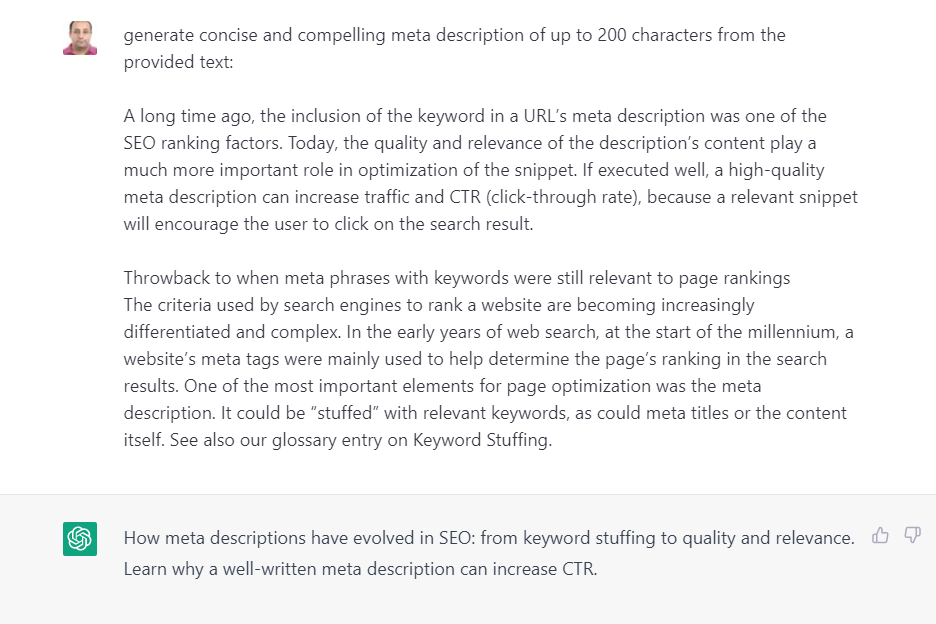 Screenshot of a meta description generated by ChatGPT, January 2023
Screenshot of a meta description generated by ChatGPT, January 202323. Optimize For PAA Box And Featured Snippets
SEO professionals may need help getting related questions from users to optimize content for a specific keyword.
You can use ChatGPT to get these related questions to make your content more helpful.
If you have a travel blog, you may ask: Related questions regarding "cozy cities in Germany," and ChatGPT will draw many queries which really make sense.
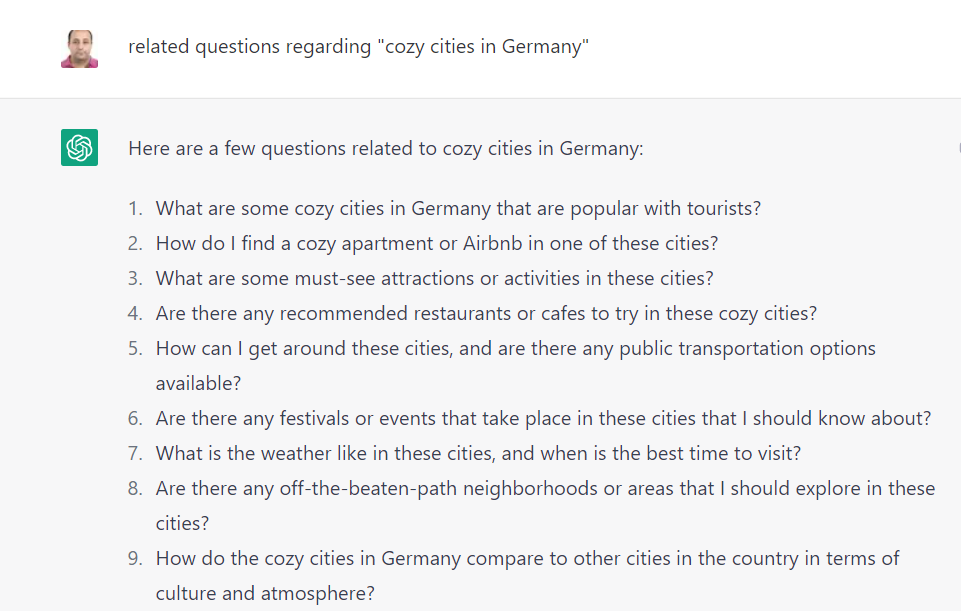 Screenshot of ChatGPT performing keyword research, January 2023
Screenshot of ChatGPT performing keyword research, January 2023Of course, there may be ones that don’t make sense – but they will do 90% of the job.
The questions it suggests may not have any search volume, but it is still worth going after them because zero search volume keywords may drive significant traffic.
24. Generate FAQ For The Product With Answers
If you have an ecommerce store and want to enhance your product pages with an FAQ section, you can ask ChatGPT to help you.
The example prompt I used is Generate FAQ for the Galaxy A23 5G with answers. Based on the results generate also FAQ schema.
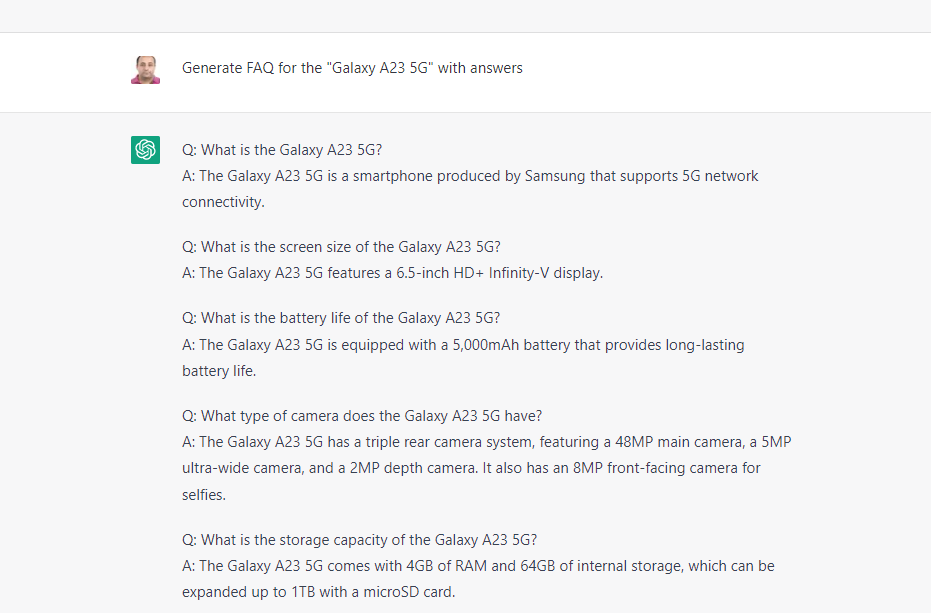 Screenshot of ChatGPT generating FAQ for a product, January 2023
Screenshot of ChatGPT generating FAQ for a product, January 2023And you can shoot two rabbits with one shot, as you will also get an FAQ schema you can use.
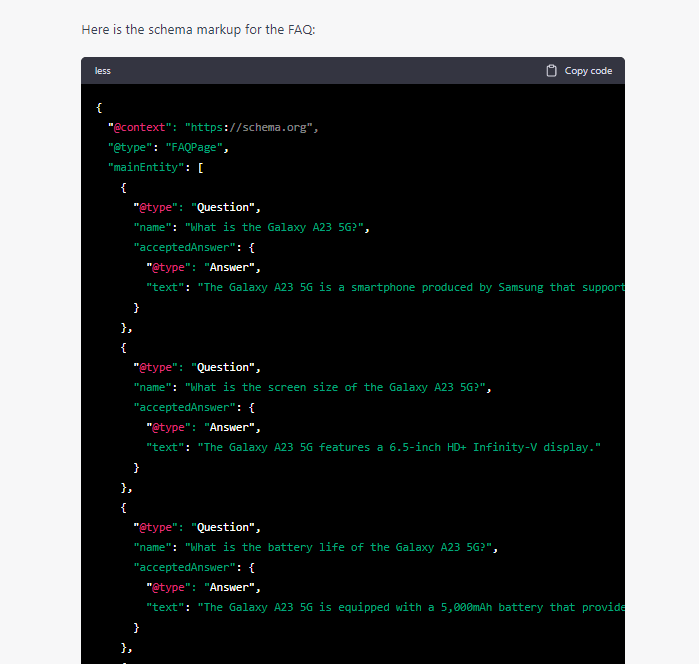 Screenshot of ChatGPT generating an FAQ schema, January 2023
Screenshot of ChatGPT generating an FAQ schema, January 2023Pretty simple, isn’t it?
If you worry about being penalized by Google for AI-written content, I think you are okay as long as you fact-check and revise it for errors.
But I am strictly against generating full article copy using ChatGPT because you must fact-check it and likely spend more time revising it than writing from scratch. With the rise of AI detectors, Google may eventually be able to detect it.
Treat ChatGPT as an assistant that you can use wisely when you next an extra hand.
25. Suggest Heading Tags
Let’s say you have a big chunk of text and want to get ideas about what subheadings to add to make your content more structured.
You can ask ChatGPT to do that time-consuming editorial task for you just by asking, Suggest H2 subheadings to content below without modifying the text.
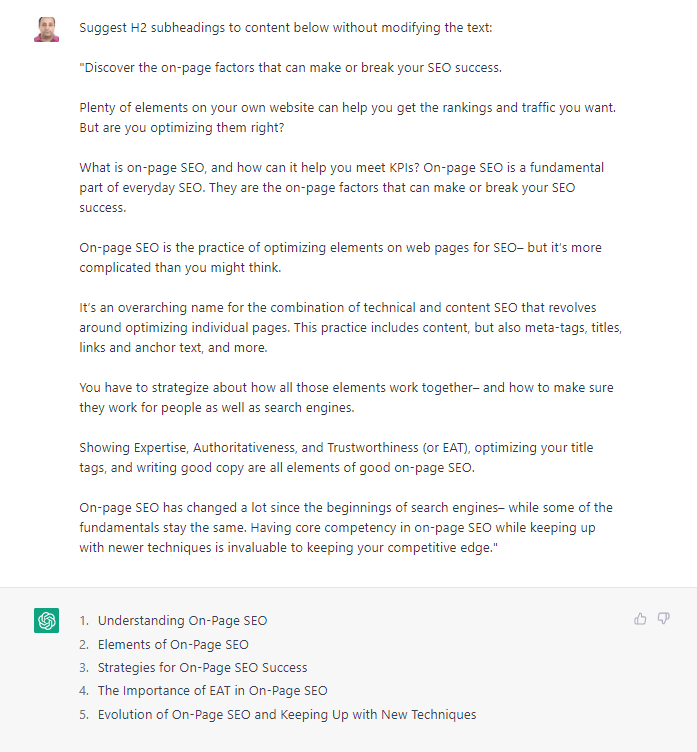 Screenshot of ChatGPT generating subheadings, January 2023
Screenshot of ChatGPT generating subheadings, January 2023Of course, it might not always offer exactly what you wanted, but you may play with the prompt and add more context to it – or take ChatGPT hints and work from there by adding your edits to subheadings.
Conclusion
There are talks that ChatGPT is going to replace humans, and many professions are just going to die out.
In my personal opinion, that won’t happen – but ChatGPT will make life easier in different industries and professional fields.
Make sure also to check out the AIRPM Chrome add-on, as it contains tons of useful prompts you can use.
Have you got an example of using ChatGPT? Share with us on Twitter and we might feature you.
More Resources:
Featured Image: LALAKA/Shutterstock
 seolounge
seolounge